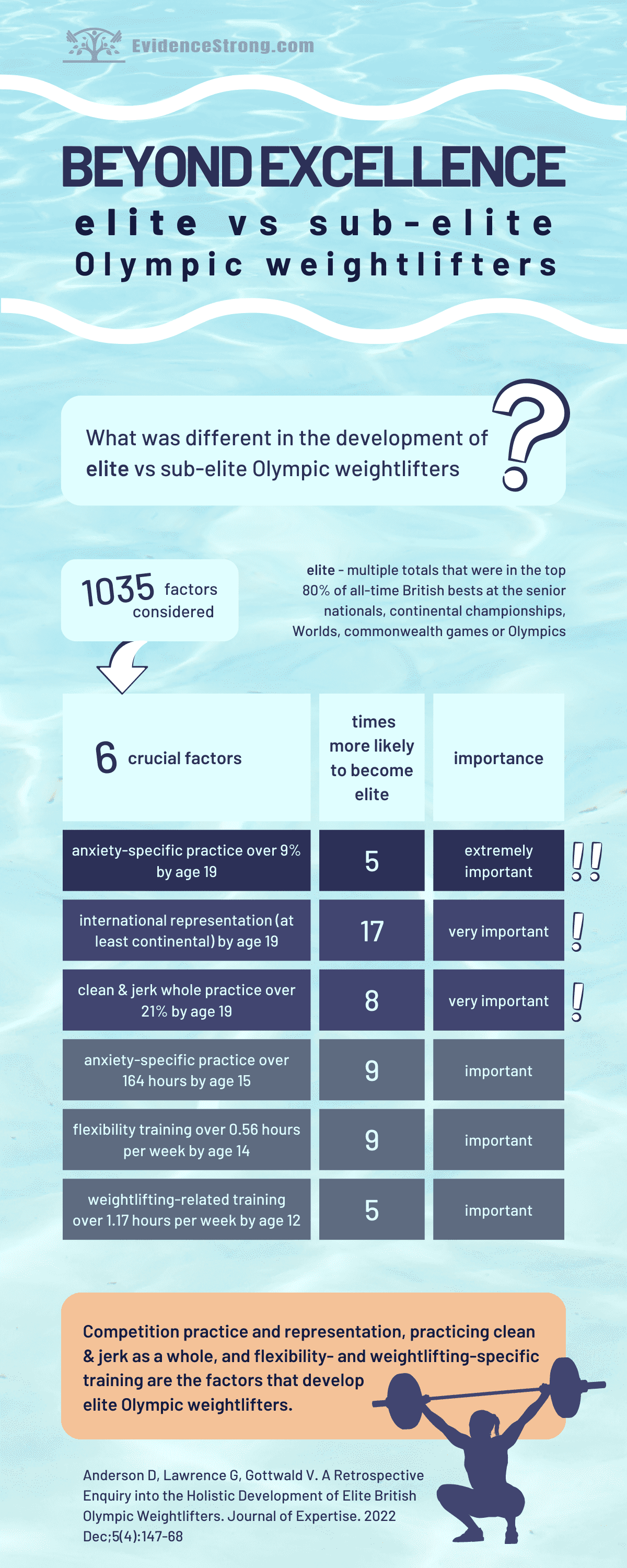Summary of a research study analyzing factors distinguishing elite from sub-elite weightlifters.
Predicting talent in Olympic weightlifting
Predicting sporting talent accurately has always fascinated researchers and coaches. However, consistently achieving this goal has been challenging due to oversimplified models that fail to consider the many factors that contribute to talent.
Talent is multifaceted, specific to each sport, and changes over time. To better understand talent development in weightlifting, a recent study took a retrospective and multidisciplinary approach. By analyzing the biographies of elite and sub-elite Welsh weightlifters, the study identified important factors that set them apart.
Understanding talent development in Olympic weightlifting
How to develop the talent is hard to define or study. This study focused on different aspects of talent development, such as personal background, family involvement in sports, past sporting experiences, competitive milestones, and specific training methods used in weightlifting.
Researchers collected a large amount of data through 3-hours-long interviews with 23 (11 females, 12 males) current and past senior Welsh weightlifters. Out of the data, researchers defined 1035 variables, and examined how these factors changed over the athletes’ lives and found patterns that were associted with higher odds of success.
Revealing the predictive model
Using advanced machine learning techniques, researchers identified the most important factors that distinguished elite weightlifters from sub-elite athletes. By calculating odds ratios, researchers determined exactly how important each factor was in develping elite weightlifters.
Surprisingly, the final model only needed 6 out of the many variables to classify athletes correctly with 86% accuracy. These variables included the amount of weightlifting practice before the age of 12, the time spent on flexibility and mobility training at age 14, the focus on the clean and jerk as a whole practice by age 19, the amount and proportion of practice related to anxiety management at ages 15 and 19, and the representation at the international competition by age 19.
Main results
Conclusions
This study on talent development in weightlifting is an important step toward understanding how to develop elite Olympic weightlifters. By taking a retrospective and multidisciplinary approach, researchers discovered key factors that differentiate elite weightlifters from sub-elite athletes.
The findings emphasize the need to consider competition practice and representation, practicing clean & jerk as a whole, and flexibility- and weightlifting-specific training. Additionally, the study highlights the significance of listening to athletes’ experiences, which can provide valuable insights into the journey toward success in the sport.
With further research and application, these findings have the potential to improve talent development strategies, helping us support future champions in Olympic weightlifting.
Take home message
Interview with the author of the original article
Dr. Vicky Gottwald is a Skill Acquisition Lecturer at Bangor University and a renowned researcher in coaching instruction and talent development. With extensive experience as a UKCC Level 4 basketball coach, she applies her expertise in practice and leads projects to enhance the performance of Welsh athletes as the Talent Identification and Transfer lead for the Welsh Institute for Performance Science (WIPS). She works with Welsh Weightlifting.
Original article
Anderson D, Lawrence G, Gottwald V. A Retrospective Enquiry into the Holistic Development of Elite British Olympic Weightlifters. Journal of Expertise. 2022 Dec;5(4):147-68.
You might want to read next
How many female weightlifters experience urinary incontinence?
